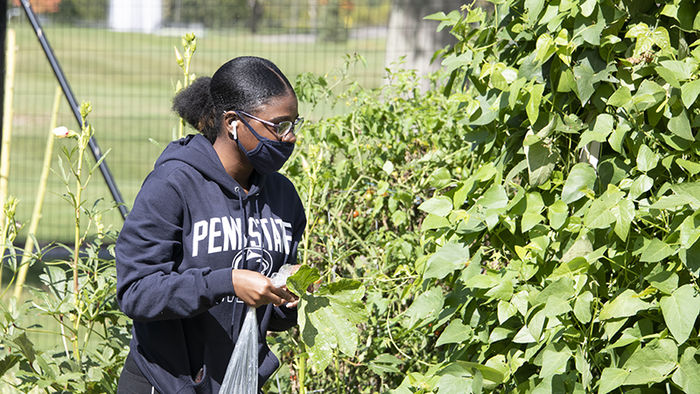Did you know our campus has a community garden?
Located beside the campus University House, this 40x70 ft. campus garden is designed to help our community learn to eat healthier, save money, and begin to connect the foods they eat with where they come from.
Established in 2020, the garden began with only 40 plants growing in 14 raised beds dedicated to cabbages, legumes, sweet potatoes, acorn squash, sweet corn, and various herbs. Today it's expanded outside its enclosure and now includes 110 different plants. Visitors can now enjoy a Native American medicine wheel growing 36 beneficial herbs, hot peppers, leeks, quinoa, sorghum, sunchokes, and more!
Planning a visit? Take what you need from the garden and fill out a brief form to keep our garden's inventory up to date.
Rules of Engagement
Our community shares this garden's bounty like a family. Please follow our rules of engagement, which are adapted in part from a Native American code of conduct.
Only take what you need. Limit your harvest to one plastic bag every week. Don't pick all of the vegetables, and if you're picking beans, stick to one side of the pole.
Share what you take. Sharing food with somebody important is a great way to show affection. Consider making a salad for your friends!
Replace what you take. Volunteers work year-round to maintain our garden. Enjoying its harvest? Consider volunteering yourself by raking leaves and composting in autumn or planting seeds in spring. Even simple tasks like weeding are greatly appreciated. Interested in volunteering? Call 724-430-4199 for more information.
Never step on raised beds. These provide drainage which aerates soil, helping microbes which benefit the plants above. Stepping on raised beds compacts the soil into dirt, which plants have difficulty growing in. Always use the walkways between raised beds to maneuver around the garden.
Never harvest if plants are wet. Plants are susceptible to their own specific diseases, and touching their water covered leaves could spread pathogens dangerous to their immune systems. Refrain from touching crops with morning dew or after a rainstorm.
Always close the gate when you leave. Be mindful when exiting the garden. Closing the gate helps keep animals like deer, rabbits, and groundhogs from munching on the plants and vegetables!
Lastly, enjoy yourself. Our garden is a labor of love. It plays a crucial role in providing a sustainable source of fresh produce, and spending time in it can promote mental and physical wellness.

